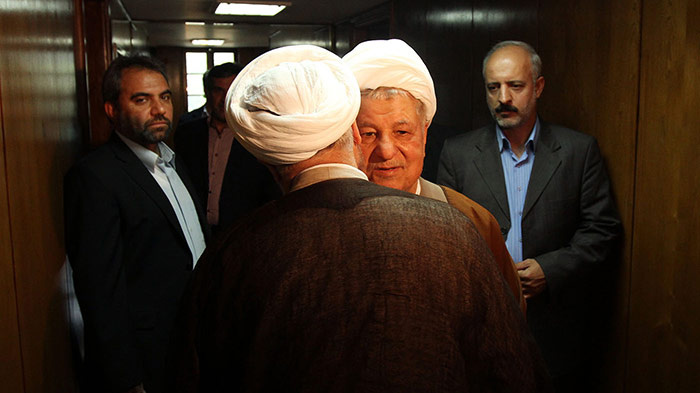Moderates and Reformists in Post-Rafsanjani Iran: Rouhani as a true heir?

With the death of Akbar Hashemi Rafsanjani, there is no doubt that President Hassan Rouhani has lost a prominent supporter in power. Not only did what many call ‘the later Rafsanjani’, a post-2009 version of Akbar Hashemi, contribute substantially to Hassan Rouhani’s election to presidency in 2013, but also his advocacy of Rouhani’s major domestic and foreign policies enabled the current president to stand increased pressure from radical Principlists.
Rafsanjani, first and foremost, openly backed Rouhani in his policy of détente with the West that resulted in the landmark nuclear deal, putting an end to years of oppressive sanctions. He also supported Hassan Rouhani’s choices of ministers, economic measures, Charter of Citizens’ Rights, and many other initiatives and never ceased to voice concern about and reveal real intentions behind pretentious solicitousness of the hardliners who spared no effort to undermine Rouhani’s plans to rebuild the country from the ‘ruins’ left at the end of Ahmadinejad’s presidential term.
It would be wishful thinking to assume that the almost decade-long allegiance of the Reformists and moderates has an easy task to fill the void created by the death of Hashemi Rafsanjani as a master playmaker. In the 2016 elections of the parliament and Assembly of Experts, Akbar Rafsanjani initiated a moderate-Reformist coalition in a bid to eliminate as many hardliners as possible from decision-making centers in order to pave the way for Rouhani’s administration. Many observers agree that Rafsanjani’s loss could be detrimental to Rouhani’s reelection in the upcoming presidential election, too.
Without Hashemi, there will be no mediator between the establishment and the Reformists, to function as the latter’s lifeblood. The vacancy that Hashemi has left behind offers quite few alternatives. These include the self-proclaimed ‘retired’ politician and former speaker of the parliament Ali Akbar Nategh Noori, former president Mohammad Khatami - who is under increasingly tight media bans, and Ayatollah Khomeini’s grandson Hassan Khomeini whose zero experience in politics handed him a disqualification to run for the Assembly of Experts early last year. That leaves Hassan Rouhani as the only plausible alternative to Hashemi Rafsanjani.
While Rouhani lacks Hashemi Rafsanjani’s credit and background but he is the most similar to him in various aspects. Like Hashemi, Rouhani has undertaken high-ranking positions including his terms as an MP and Deputy Speaker, his long tenure as chairman in the Supreme National Security Council, consecutive terms in the Assembly of Experts, and now his presidency. Rouhani’s versatile dossier is in one sense a 30-year dossier of internship in war leadership, diplomacy, legislation, intelligence, security, and executive affairs. His is perhaps still no match for Hashemi Rafsanjani’s life of political play, but is only little short.
Hashemi Rafsanjani’s death could bear good or bad ramifications for Rouhani, depending on the president’s own handling of the situation: good if he uses it as an opportunity to emerge as the ultimate leader of the moderates, keeping Reformists attached to establishment more firmly than ever, and bad if he fails and let his side become more easily sidelined.
In the meantime, Rouhani’s assumption of his new role hinges on the middle ground he is supposed to find between the Principlists in power and the Reformists that have been pushing for influence over the past decade. The latter finds itself in the same boat with Rouhani. However, it has no time for lamentation.
In the meantime, Shargh daily has warned fellow Reformists against confusing loss of an emotional bulwark with loss of a real power. After all, “the leverage Hashemi Rafsanjani provided in official politics had slimmed in the recent years while his social weight was admittedly on the rise” the newspaper reminded. Hashemi was an omen that gave Reformists and moderates confidence, the paper wrote, but could not do much in official politics. According to the paper:
“… [Reformists and moderates] resemble people who have risen from ashes with help, are now on their feet, and walk but still think they are walking with help. Now that the help is gone, they are afraid they will fall. It takes a while for them to figure out that Hashemi’s siding with them was only one of an emotional, psychological nature.”
The pro-reform daily advises the Reformists and moderates to convert Hashemi’s loss into symbolic power that could cement their status in the establishment and an emotional backbone that could work for a long time, before Hashemi’s social capital is passed to an individual or group that resembles him best.
To fully realize that resemblance, Rouhani should do his best to protect the nuclear deal and to do so, the least he must do is remain in office. He will also need to take his political involvement to a higher level and expand his umbrella of alliances. As Massoumeh Torfeh noted in an op-ed published on Al Jazeera, among other things, Hashemi Rafsanjani’s legacy includes a network of operatives across the country. Rouhani’s litmus test relies in his ability to mobilize them, in the upcoming presidential race.

